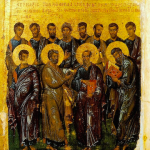I have a question about being a lector that I am of two minds about. I can see both sides of the question and I wanted to lay my problem out here for discussion. This Sunday’s second reading is from Romans 15:4-9. Verses 8 and 9 read
For I say that Christ became a minister of the circumcised
to show God’s truthfulness,
to confirm the promises to the patriarchs,
but so that the Gentiles might glorify God for his mercy.
I am a lector today so I was going over the reading carefully, and the conjunction “but” in the last line caught my eye. As written, the sentence strikes me as ungrammatical, or at least extremely awkward. Reading it out loud it sounded wrong to my ear: the sentence feels incomplete and I keep waiting for the idea that is being introduced by the word “but.” Further, the word “but” does not seem to fit the sense of the passage. The word “but” is usually used to introduce some contrasting thought and not to link two parallel ideas. Using “but” in this sentence seems to suggest that Christ did not come to the Jews to confirm the old covenant but rather to forge a new covenant with the Gentiles.
Since Christ came to do both of these things, it would seem better to translate this as “and.” Checking a few other translations, I saw that this is the more common translation: the New Revised Standard Version uses “and”:
For I tell you that Christ has become a servant of the circumcised on behalf of the truth of God in order that he might confirm the promises given to the patriarchs,and in order that the Gentiles might glorify God for his mercy. (NRSV);
The New Jerusalem Bible uses “and…also”:
I tell you that Christ’s work was to serve the circumcised, fulfilling the truthfulness of God by carrying out the promises made to the fathers, and his work was also for the gentiles, so that they should give glory to God for his faithful love (NJB);
the New International Version uses the words “and moreover”:
For I tell you that Christ has become a servant of the Jews on behalf of God’s truth, so that the promises made to the patriarchs might be confirmedand, moreover, that the Gentiles might glorify God for his mercy.
Putting all of this together, I think the word “but” in the NAB is not an appropriate translation, and that “and” would both convey the meaning better and would sound better as well.
So with this as the background, here is my question: would it be acceptable for me, as a lector, to substitute the word “and” for “but” when proclaiming this passage? Here, two responsibilities of a lector collide: a lector is to proclaim the reading faithfully and clearly. If you interpret faithfully as meaning “faithful to the literal text” then it seems hard to do both in this case. If I am faithful to the text as written, clarity is lost. If I clarify the text, I am no longer reading it as the Church has set it out.
Now this might sound quite picayune: this correction is so small that I doubt anyone would notice, even among the people who follow along in the missalettes. But I am very mindful of the can of worms I am opening by suggesting that lectors be allowed to make such corrections. One of my most painful memories (in terms of bad lectoring) is of listening to a priest butcher the story of the rich young man from Luke because he wanted to make the passage gender neutral. Obviously, this is an extreme case and quite different from the correction I am suggesting: here the priest was trying to impose something extrinsic to the text on it and with no regard for how his “corrections” sounded.
One solution would be to ask my pastor before mass, but this seems to be just passing the buck: the priest seems to have no more authority in this regard than the lector, and the proclamation of the word is as much the lector’s responsibility as his. (Though in fact I will probably ask him.)
A parallel situation would be the priests who make (usually small) corrections to the text of the mass. As Julia noted somewhere, there are priests who say “for the many” instead of “for many” in the consecration, and over the years I have seen other priests who have penned small changes into their missals and prayer books. Again, there are good reasons on both sides of the argument for and against these changes.
Another similar situation comes from theater. Every play begins with a fixed script from the hands of the author. Some directors take liberties with this before a production; other times actors will “go up” on their lines in a performance, either deliberately or quite unconsciously, making a change that highlights something different in the performance. Both practices are relatively common, but neither is universally accepted, as fidelity to the text is highly regarded and in some circles the text is considered sancrosanct. This practice is not entirely parallel to my question: liturgy is not theater, and in particular lectors are not actors. (Some need to have this point made to them quite firmly.) Nevertheless, theater is about conveying meaning through the spoken word, and it would be parochial to not look to their experience for some insight.
So what should be done? The only hard and fast rule would be to hold my nose (as it were) and read it as written. But if some flexibility and discretion to the lector is granted, how should it be circumscribed: when would a correction go too far? Are there other facets of this question that I am overlooking? I look forward to your thoughts on this matter.
















